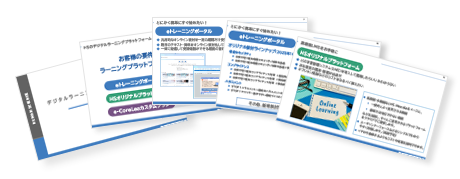2023.11.14
What is LXP? Introducing Platforms that Enhance the Learning Experience

1. What is LXP?
LXP stands for "Learning Experience Platform," which is a platform designed to enhance the learning experience. This platform is characterized by its ability to provide optimal learning programs tailored to the individual preferences and interests of learners. LXP can select and display highly relevant information and content of strong interest to learners from various internal and external sources. This mechanism is similar to how Amazon's website automatically shows items of interest based on a user's past behavior. Because the displayed content can be customized for each individual employee, it helps facilitate efficient learning.
Difference from LMS
There is a tool similar to LXP called "LMS." LMS stands for "Learning Management System" and is also referred to as a "learning management system." It is a tool for managing learning, capable of managing learning materials, learner grades, and assignment progress. While LMS is a tool for managing employees' overall learning, LXP is a tool designed to enhance employees' learning experiences. For example, LMS is suitable for common training for all employees, such as new employee orientation and compliance training. It is important not to choose one over the other but to use them appropriately according to the needs.
2. Benefits of Implementing LXP
We will introduce the specific benefits of implementing LXP.
Providing Opportunities to "Learn from Experience"
Providing opportunities to "learn from experience" is a key reason why LXP is gaining attention. This is because, according to the rule called the "70-20-10 model," 70% of growth is related to actual experience. In other words, rather than companies creating training content, it is considered more effective to connect learners' experiences to their learning.
In an LXP, learners choose the topics they want to study themselves and actively engage in learning. Through a specially designed platform, they can acquire practical skills and knowledge related to their work. In other words, learners study not because "their boss instructed them to," but based on "experiences where they feel a need." Motivation for learning is likely to increase through experiences that solve challenges.
Personalized Education
LXP can provide customized educational programs tailored to individuals. In a typical LMS, companies select and offer courses and materials, making it difficult to adjust to learners' needs and motivation. This includes issues such as "the learning content being too difficult," "unclear learning objectives," and "inability to apply what was actually learned."
The idea of "everyone receiving the same education" can enhance team cooperation, but individual growth and career advancement differ. A uniform education plan can sometimes have negative effects. This is where LXP comes in, providing education tailored to the learner’s position, job content, and interests. For example, learners can set their own learning content and goals, such as "What should I learn to advance my career?" or "How can I effectively acquire a specific skill?"
Furthermore, based on the learning history, the platform suggests the most suitable learning content, supporting self-directed learning. Personalized education through LXP accommodates diverse career growth and contributes to the overall skill enhancement of the organization.
Providing New Learning Formats through Integration with Other Systems
By combining LXP with other systems, it is possible to offer new learning platforms. For example, LXP can be linked with LRS (Learning Record Store). Additionally, connecting LXP with AI (Artificial Intelligence) can further enhance the efficiency of employees' learning processes.
Training Content Can Be Customized According to Corporate Challenges
By using LXP, you can select and implement training tailored to your company's unique challenges from a variety of training options. For example, companies facing sales challenges can focus on sales-related training, while those with management skill issues can prioritize management-specific training. By customizing training to fit your company's needs, you can smartly choose the optimal training content and advance employee skill development. Furthermore, by conducting training focused on specific areas, it is also possible to strengthen the company's strengths and reinforce its weaknesses.
Improved Learner Motivation
By using LXP, learners have the freedom to choose training that helps them overcome their weaknesses or enhance their strengths, which leads to increased motivation for learning. Forcing the same training on all employees can sometimes fail to inspire motivation, but allowing learners to select their own learning paths boosts their enthusiasm. Additionally, LXP’s learning content often includes short videos that can be accessed during spare moments such as commuting or before bedtime, enabling employees to learn effectively. With high motivation and efficient learning, skill improvement will progress rapidly.
3. Points to Note When Introducing LXP
LXP has many advantages, but there are key points to consider when implementing it. Next, we will explain the precautions to take when adopting LXP.
Traditional "Long-duration e-learning" Does Not Fit
For many working people, the time available for "learning and self-improvement" is usually only a few minutes each day. The reality is that time for learning is limited. Few people have a fixed time every day dedicated to learning, and it is common to obtain information via the internet during commutes or breaks at work.
Therefore, it is effective for the content within the LXP to be short. Providing opportunities to learn during lunch breaks, rest periods, or short intervals between work promotes continuous learning among employees. Companies that offer traditional long-format e-learning materials will need to devise ways to convert these into shorter "microlearning" segments.
Mobile Compatibility Is Necessary
Behind the spread of LXP is the increasing demand for the use of mobile devices. In corporate education, some people may have concerns about the use of mobile devices. Common concerns regarding e-learning so far include the following points.
・Impact on working hours (whether learning time is considered working hours)
・Security issues (permission to use personal devices)
・Issues related to learning effectiveness (whether the quality of learning is compromised compared to using a PC)
LXP aims to optimize learning individually, and the ideal is to enable learning anytime and anywhere. Therefore, completely prohibiting learning outside of business hours or outside the company, as well as the use of personal devices, makes it difficult to fully leverage the benefits of LXP. It is important to adhere to the obligations of traditional learning while not hindering individual learning motivation.
Administrators Need to Understand Learners' Needs
For LXP administrators, selecting learning resources plays an important role. Through the LXP, you can provide e-learning content, books, videos that help improve skills, and more, but it is the administrator's responsibility to choose information that matches the actual needs of learners and to take measures that promote learning. Neglecting these elements may limit the effectiveness of the LXP even if it is implemented.
Administrators must always understand questions such as, "What skills are needed within the organization? Which learning resources are of high interest?" In today's information-saturated society, the ability to discern truly useful information is essential. A suitable platform is necessary for learners to enhance their individual skills and advance their careers. The goal is not merely to implement an LXP, but to build a platform that is closely tied to practical work and can provide the latest information.
Increased Administrative Burden
While using an LXP offers many benefits to learners, it can also increase administrative tasks for managers, such as providing guidance and organizing training content, thereby adding to their workload. It is important that not only managers but the entire organization supports the implementation and provides learners with opportunities for self-directed learning.
4. Summary
This time, we introduced LXP. LXP is a platform that allows customization of the learning environment according to the preferences and interests of learners. It offers greater flexibility than LMS in terms of enhancing employee skills and effectively utilizing gaps in work time. The demand for LXP is supported by the evolution of DX and the increase in mobile users, and it is expected to further increase with the spread of 5G.
LXP is an effective platform for learners to study proactively, and it is worth considering its implementation whether you have experience with e-learning or are new to it. Considering that each employee faces different challenges and that training content evolves daily, it is important to provide the latest training materials and optimize learning efficiency. By adopting LXP, employee learning efficiency improves, contributing to the overall performance enhancement of the organization. We encourage you to actively consider its introduction.
Human Science Co., Ltd. supports the implementation and operation of Totara's "Totara Learn, Engage, Perform" as an LXP.
> Human Science | Strongly Supporting Corporate Human Resource Development with LXP Totara Learn
> Totara Official SiteHuman Science offers a variety of services related to e-learning. For details, please refer to the following.
> Moodle Implementation Support and Operation
> E-learning Content Production
> E-learning Content Translation (Multilingual Support, Localization)












